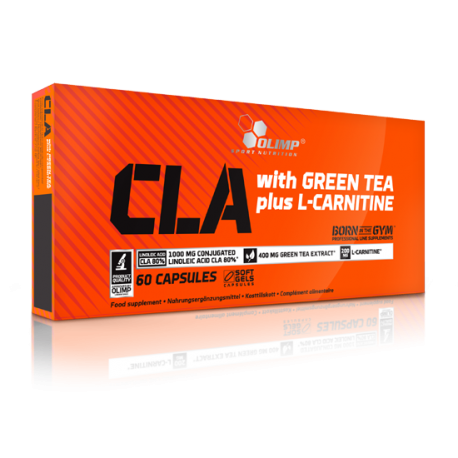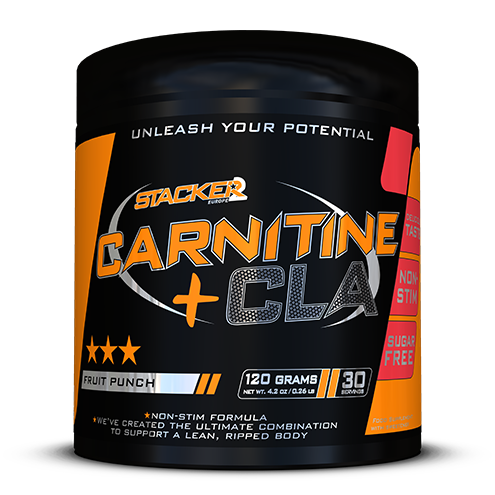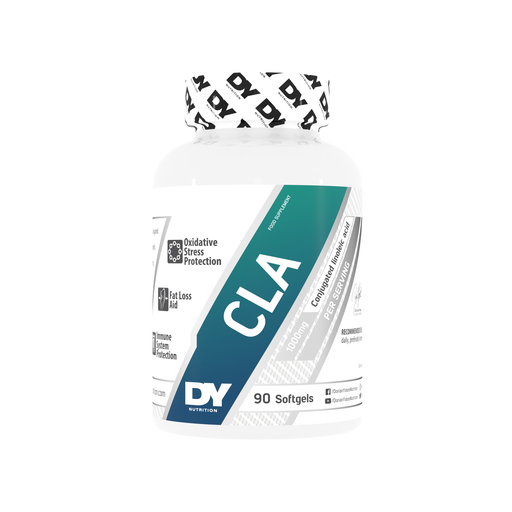CLA
-
 Save 11%
Save %
Original price €24,90Original price €24,90 - Original price €24,90Original price €24,90Current price €22,16€22,16 - €22,16Current price €22,16| /
Save 11%
Save %
Original price €24,90Original price €24,90 - Original price €24,90Original price €24,90Current price €22,16€22,16 - €22,16Current price €22,16| /CLA & Green Tea Plus L-Carnitine · 60 capsules
Olimp Sport NutritionNo reviewsOlimp CLA & Green Tea Plus L-Carnitine supports fat loss. The combination of CLA, green tea and L-carnitine accelerates the fat loss process. ...
View full detailsOriginal price €24,90Original price €24,90 - Original price €24,90Original price €24,90Current price €22,16€22,16 - €22,16Current price €22,16| /Save 11% Save % -
 Save 0%
Save %
Original price €24,90 - Original price €24,90Original price €24,90€24,90€24,90 - €24,90Current price €24,90| /
Save 0%
Save %
Original price €24,90 - Original price €24,90Original price €24,90€24,90€24,90 - €24,90Current price €24,90| /Carnitine + CLA · 120g
Stacker 22 reviewsL-carnitine and CLA are key elements in fatty acid metabolism. L-carnitine transports fatty acids to the mitochondria for energy production. CLA ...
View full detailsOriginal price €24,90 - Original price €24,90Original price €24,90€24,90€24,90 - €24,90Current price €24,90| /Save 0% Save % -
 Save 11%
Save %
Original price €17,90Original price €17,90 - Original price €17,90Original price €17,90Current price €15,93€15,93 - €15,93Current price €15,93| /
Save 11%
Save %
Original price €17,90Original price €17,90 - Original price €17,90Original price €17,90Current price €15,93€15,93 - €15,93Current price €15,93| /CLA · 90 softgels
DY NutritionNo reviewsCLA effectively supports fat loss and is proven by empirical evidence. Extracted from safflower plants, provides 1000mg of modified omega-6 fatty...
View full detailsOriginal price €17,90Original price €17,90 - Original price €17,90Original price €17,90Current price €15,93€15,93 - €15,93Current price €15,93| /Save 11% Save %
Due to its unique effects, conjugated linolenic acid(CLA) plays an important role in protecting against chronic diseases. This primarily includes the prevention of malignant cancers and their progression. In addition, the intake of CLA with the daily diet also leads to a reduction in body fat. A few years ago, the discovery ofconjugated linoleic acid(CLA) led to a scientific sensation. After all, this fatty acid derivative has been shown to have particularly strong anti-tumor properties.
Studies have shown that these properties inhibit malignant cancers such as breast cancer, prostate tumors, gastrointestinal carcinomas and malignant skin tumors (e.g. melanoma). Biochemically, linolenic acid is an essential fatty acid (like arachidonic acid and linoleic acid) that cannot be synthesized in the body and must therefore be supplied with food. CLA is a slightly modified derivative of linolenic acid and is found in large quantities in red meat and cheese. CLA is also found in chicken meat, eggs and corn oil.
An actual deficiency of CLA is difficult to prove. However, there are a number of indications from scientific studies that a diet low in CLA leads to an increase in body fat in the long term and is therefore likely to be an important factor in the development of obesity. Due to its unique mechanisms of action, CLA has a number of effects in terms of preventing chronic diseases and also has a positive influence on reducing body fat. For this reason, CLA is now available as a dietary supplement.
CLA is a powerful antioxidant that also has anti-carcinogenic and anti-catabolic effects. Furthermore, CLA acts as a potent stimulator of the body's immune system, which may be responsible for the preventive properties of CLA in relation to cancer development and progression. These effects of CLA have been discovered and described in numerous scientific studies. The intake of CLA with the daily diet or as a dietary supplement leads to a reduction in the ratio between pure body mass and body fat percentage. Furthermore, there is less fat deposition in the abdominal area, and CLA also leads to an increase in muscle formation.
Physiologically, these effects are due to an increase in insulin sensitivity in peripheral tissue, so that free fatty acids and glucose can be made available more quickly, especially to the muscles, and are not stored in fatty tissue. With regard to the anti-catabolic effects, this property of CLA is due in particular to the prevention of muscle tissue breakdown. Compared to previous generations, it has been found that there has been a relative deficiency of CLA in the daily diet, especially in the US population. This is mainly due to a change in the feeding of grazing cattle, which has reduced the CLA content in milk and dairy products.
This is because cows need fresh grass feed for optimal CLA production, which is often made impossible in today's factory farming. This CLA deficiency is probably also partly responsible for the epidemic of obesity that is spreading in America. Poor dietary habits as well as a lack of CLA in food have far-reaching effects on health and longevity. Because of its unique effects on the immune system and metabolism, CLA should therefore be an important component of any balanced nutritional supplement program.
In particular, the following active properties and effects have been demonstrated for CLA: Inhibition of malignant tumor growth - Improvement of immune system function - Increase in insulin sensitivity in peripheral tissues - Anti-catabolic effects in relation to muscle - Reduction in fat storage - Increase in body mass in relation to body fat - Cholesterol lowering and anti-atherogenic effects - Antioxidant properties Protection against osteoporosis.
Safety and side effects
Conjugated linoleic acid is probably safe when used in normal food quantities and possibly safe and harmless when used in higher, medicinal quantities. Possible side effects include stomach upset, diarrhea, nausea and fatigue.
Precautions and warnings
Pregnancy and lactation: Not enough is known about the safety of conjugated linoleic acid during pregnancy and lactation. For this reason, pregnant and breastfeeding women should avoid conjugated linoleic acid to be on the safe side. Diabetes: There are concerns that conjugated linoleic acid may exacerbate existing diabetes. Metabolic syndrome: There are concerns that conjugated linoleic acid may increase the risk of developing diabetes in people suffering from metabolic syndrome. For this reason, conjugated linoleic acid should not be used if you suffer from this disorder.
Optimal dosage in sport
Dietary measures with restriction of daily energy intake, combined with exercise, is the treatment of choice for overweight people. Low-carbohydrate diets have proven to be superior to low-fat diets. Conjugated linoleic acid can influence the body composition of lean mass via metabolic effects and ultimately also have a weight-reducing effect. My recommendation is a daily intake of 3-5g with meals. However, you would have to consume kilograms of food in order to achieve a significant intake of CLA in this range (3-5g) per day. A dietary supplement would therefore be recommended.
References
- Larsen TM, Toubro S, Astrup A. Efficacy and safety of dietary supplements containing conjugated linoleic acid (CLA) for the treatment of obesity-evidence from animal and human studies. J Lipid Res. 2003 Aug 16 [Epub ahead of print].
- Belury MA. Dietary conjugated linoleic acid in health: physiological effects and mechanisms of action. Annu Rev Nutr. 2002;22:505-31. Epub 2002 Apr 04.
- Banni S. Conjugated linoleic acid metabolism. Curr Opin Lipidol. 2002 Jun;13(3):261-6.
- Kelly GS. Conjugated linoleic acid: a review. Altern Med Rev. 2001 Aug;6(4):367-82.
- Pariza MW, Park Y, Cook ME. Conjugated linoleic acid and the control of cancer and obesity. Toxicol Sci. 1999 Dec;52(2 Suppl):107-10.
- Miner JL, Cederberg CA, Nielsen MK, Chen X, Baile CA. Conjugated linoleic acid (CLA), body fat, and apoptosis. Obes Res. 2001 Feb;9(2):129-34.
- Oku H, Wongtangtintharn S, Iwasaki H, Toda T. Conjugated linoleic acid (CLA) inhibits fatty acid synthetase activity in vitro. Biosci Biotechnol Biochem. 2003 Jul;67(7):1584-6.
- Kilian M, Mautsch I, Gregor JI, Heinichen D, Jacobi CA, Schimke I, Guski H, Muller JM, Wenger FA. Influence of conjugated and conventional linoleic acid on tumor growth and lipid peroxidation in pancreatic adenocarcinoma in hamster. Prostaglandins Leukot Essent Fatty Acids. 2003 Jul;69(1):67-72.
- Chen BQ, Yang YM, Gao YH, Liu JR, Xue YB, Wang XL, Zheng YM, Zhang JS, Liu RH. Inhibitory effects of c9, t11-conjugated linoleic acid on invasion of human gastric carcinoma cell line SGC-7901. World J Gastroenterol. 2003 Sep;9(9):1909-14.
- Belury MA. Inhibition of carcinogenesis by conjugated linoleic acid: potential mechanisms of action. J Nutr. 2002 Oct;132(10):2995-8.
- Nagao K, Inoue N, Wang YM, Hirata J, Shimada Y, Nagao T, Matsui T, Yanagita T. The 10trans,12cis isomer of conjugated linoleic acid suppresses the development of hypertension in Otsuka Long-Evans Tokushima fatty rats. Biochem Biophys Res Commun. 2003 Jun 20;306(1):134-8.
- Noone EJ, Roche HM, Nugent AP, Gibney MJ. The effect of dietary supplementation using isomeric blends of conjugated linoleic acid on lipid metabolism in healthy human subjects. Br J Nutr. 2002 Sep;88(3):243-51.
- Riserus U, Arner P, Brismar K, Vessby B. Treatment with dietary trans10cis12 conjugated linoleic acid causes isomer-specific insulin resistance in obese men with the metabolic syndrome. Diabetes Care. 2002 Sep;25(9):1516-21.
- Watkins BA, Seifert MF. Conjugated linoleic acid and bone biology. J Am Coll Nutr. 2000 Aug;19(4):478S-486S.
- Albers R, van der Wielen RP, Brink EJ, Hendriks HF, Dorovska-Taran VN, Mohede IC. Effects of cis-9, trans-11 and trans-10, cis-12 conjugated linoleic acid (CLA) isomers on immune function in healthy men. Eur J Clin Nutr. 2003 Apr;57(4):595-603.
- Basu S, Riserus U, Turpeinen A, Vessby B. Conjugated linoleic acid induces lipid peroxidation in men with abdominal obesity. Clin Sci (Lond). 2000 Dec;99(6):511-6.
- Smedman A, Vessby B, Basu S. Isomer specific effects of conjugated linoleic acid on lipid peroxidation in humans. Regulation by alpha tocopherol and cyclooxygenase-2 inhibitor. Clin Sci (Lond). 2003 Sep 4 [Epub ahead of print].
- Degrace P, Demizieux L, Gresti J, Chardigny JM, Sebedio JL, Clouet P. Association of liver steatosis with lipid oversecretion and hypotriglyceridaemia in C57BL/6j mice fed trans-10,cis-12-linoleic acid. FEBS Lett. 2003 Jul 10;546(2-3):335-9.



